| Article ID | Journal | Published Year | Pages | File Type |
|---|---|---|---|---|
| 367038 | Nurse Education in Practice | 2010 | 7 Pages |
Mathematical ability is a skill nurses need to safely administer medicines and fluids to patients (Elliott, M., Joyce, J., 2005. Mapping drug calculation skills in an undergraduate nursing curriculum. Nurse Education in Practice 5, 225–229). However some nurses and nursing students lack mathematical proficiency (Hilton, D.E., 1999. Considering academic qualification in mathematics as an entry requirement for a diploma in nursing programme. Nurse Education Today 19, 543–547). A tool was devised to assess the mathematical abilities of nursing students. This was administered to 304 nursing students in one Higher Education Institution (HEI) in Wales, United Kingdom (UK) on entry to a pre-registration undergraduate nursing course. The students completed a diagnostic mathematics test comprising of 25 non-clinical General Certificate of Secondary Education (GCSE) level multiple choice questions with a pass mark set at 72%. The key findings were that only 19% (n = 53) of students passed the test. Students appeared to have difficulties with questions involving decimals, SI units, formulae and fractions. The key demographic variable that influenced test scores was previous mathematical qualifications on entry to the course.The tool proved useful in two ways. First, in identifying those students who needed extra tutorial support in mathematics. Second, in identifying those areas of mathematics that presented difficulties for students.
